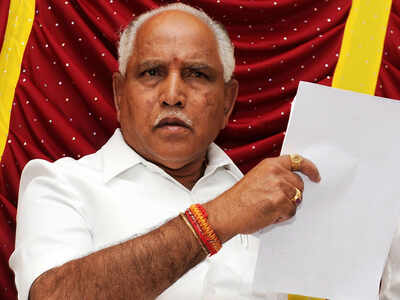
BENGALURU: After formally launching 'Jana Sevaka' initiative less than a month ago, the Karnataka government, reeling under a financial crisis, is scrambling to save the scheme that aims to deliver government documents to citizens' doorsteps.
The scheme requires substantial allocations, but the crisis-hit government is considering a public-private partnership (PPP) model to keep it afloat. Chief minister BS Yediyurappa announced in his budget last week that the scheme would be extended to all 28 assembly constituencies in Bengaluru city and 10 city corporations in Karnataka. But he did not allocate funds for the purpose.
Although formally launched earlier this year, a pilot has been under way since March 2019 in four assembly constituencies - Dasarahalli, Bommanahalli, Mahadevpura and Rajajinagar. Officials said more than 41,000 transactions were successfully completed since then. The figure is a modest one, but officials said with awareness it is bound to grow.
Now, the e-governance department has been forced to fend for itself. It has a meagre allocation of Rs 8 crore for both Jana Sevaka scheme and Seva Sindhu - an online initiative to receive applications from citizens to avail government services. "Given practical issues, a PPP model is the most viable option for Jana Sevaka. Tenders will soon be floated to identify a vendor for the service," said Varaprasad Reddy, project director, Jana Sevaka and Seva Sindhu.
The Jana Sevaka pilot offered to deliver 53 documents from six departments. And while the government plans to eventually include all 1,017 services from across 300 departments under the scheme, no new services were offered when the project was formally launched. Efforts were on to include the 451 services from 45 departments enlisted under the Seva Sindhu portal in the first phase. But the entire exercise calls for humongous resources and manpower.
This, despite applicants having to pay Rs 115 per transaction as delivery charge, besides the fee for the document. Officials estimate it would require at least five Jana Sevakas (delivery boys) in each of the 198 BBMP wards.
The government pays Rs 13,000 plus incentive as monthly salary to a Jana Sevaka, who has to be a graduate. The unattractive salary has resulted in a high attrition rate. Sakala minister S Suresh Kumar is learnt to have requested Yediyurappa for additional funds, but the CM hasn't obliged.
"The PPP model will not just make the scheme sustainable, but also fetch revenue to the exchequer," said Rajeev Chawla, additional chief secretary, e-governance. "The agency that lands the contract will share the revenue with the government."
How the Jan Sevaka scheme works
A citizen needs to apply for the required service online on Seva Sindhu web portal. A designated Jan Sevaka, an outsourced employee, would then meet the applicant, fill up forms and scan documents (such as proof of residence or identity) through a tablet. The Jan Sevaka would then deliver the document applied for at the citizen's doorstep within a stipulated deadline.
At present, the 53 services include income certificate, land-holding certificate, old-age pension and widow pension. About 35 people are employed. Currently, the entire fee of Rs 115 per service goes to the government, but under PPP model it will be shared with the agency on an agreed ratio.
The scheme requires substantial allocations, but the crisis-hit government is considering a public-private partnership (PPP) model to keep it afloat. Chief minister BS Yediyurappa announced in his budget last week that the scheme would be extended to all 28 assembly constituencies in Bengaluru city and 10 city corporations in Karnataka. But he did not allocate funds for the purpose.
TimesView
Jana Sevak is based on a similar scheme launched by the Arvind Kejriwal government in Delhi, but unlike AAP's model, the Karnataka one already had the software in place - Seva Sindu - to ensure its success. Both are offshoots of the up-and-running Sakala scheme. And yet, the Delhi government has been able to deliver more than 100 services at a much cheaper cost to the applicant than in Karnataka! With awareness and reliability, Jana Sevaka would certainly have attracted more applications, but that the scheme is already floundering speaks volumes about the priorities and efficiency of the government.
Although formally launched earlier this year, a pilot has been under way since March 2019 in four assembly constituencies - Dasarahalli, Bommanahalli, Mahadevpura and Rajajinagar. Officials said more than 41,000 transactions were successfully completed since then. The figure is a modest one, but officials said with awareness it is bound to grow.
Now, the e-governance department has been forced to fend for itself. It has a meagre allocation of Rs 8 crore for both Jana Sevaka scheme and Seva Sindhu - an online initiative to receive applications from citizens to avail government services. "Given practical issues, a PPP model is the most viable option for Jana Sevaka. Tenders will soon be floated to identify a vendor for the service," said Varaprasad Reddy, project director, Jana Sevaka and Seva Sindhu.
The Jana Sevaka pilot offered to deliver 53 documents from six departments. And while the government plans to eventually include all 1,017 services from across 300 departments under the scheme, no new services were offered when the project was formally launched. Efforts were on to include the 451 services from 45 departments enlisted under the Seva Sindhu portal in the first phase. But the entire exercise calls for humongous resources and manpower.
This, despite applicants having to pay Rs 115 per transaction as delivery charge, besides the fee for the document. Officials estimate it would require at least five Jana Sevakas (delivery boys) in each of the 198 BBMP wards.
The government pays Rs 13,000 plus incentive as monthly salary to a Jana Sevaka, who has to be a graduate. The unattractive salary has resulted in a high attrition rate. Sakala minister S Suresh Kumar is learnt to have requested Yediyurappa for additional funds, but the CM hasn't obliged.
"The PPP model will not just make the scheme sustainable, but also fetch revenue to the exchequer," said Rajeev Chawla, additional chief secretary, e-governance. "The agency that lands the contract will share the revenue with the government."
How the Jan Sevaka scheme works
A citizen needs to apply for the required service online on Seva Sindhu web portal. A designated Jan Sevaka, an outsourced employee, would then meet the applicant, fill up forms and scan documents (such as proof of residence or identity) through a tablet. The Jan Sevaka would then deliver the document applied for at the citizen's doorstep within a stipulated deadline.
At present, the 53 services include income certificate, land-holding certificate, old-age pension and widow pension. About 35 people are employed. Currently, the entire fee of Rs 115 per service goes to the government, but under PPP model it will be shared with the agency on an agreed ratio.
Get the app








